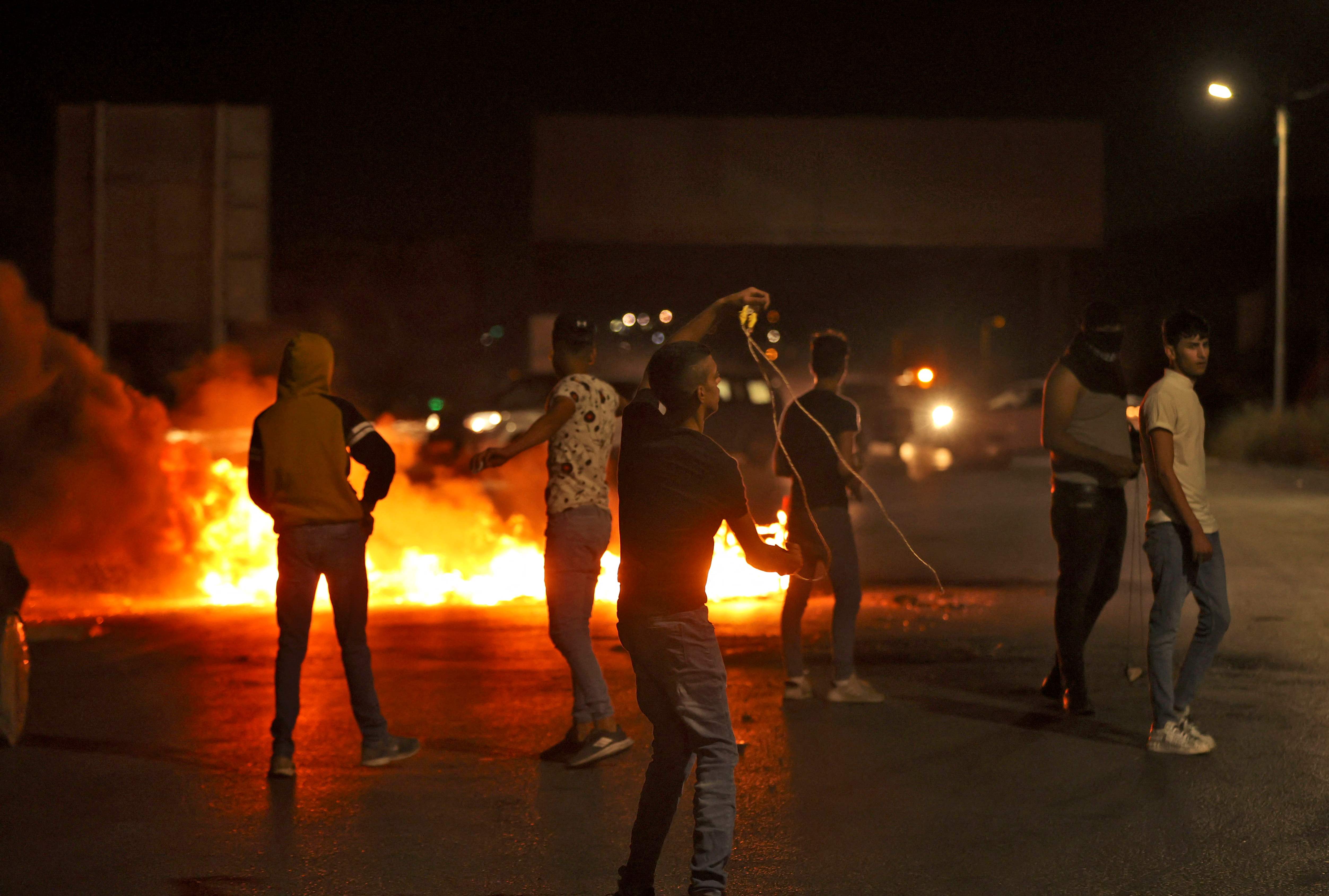Age-old grievances fuel renewed violence between Israelis and Palestinians
Sign up now: Get ST's newsletters delivered to your inbox

Palestinians hurling stones during clashes with Israeli security forces at Hawara checkpoint, south of Nablus, on May 11, 2021.
PHOTO: AFP
What's the story?
Weeks of clashes and demonstrations in Jerusalem between Palestinian protesters and Israeli police escalated in recent days into one of the most serious conflicts between the two sides in past years.
The latest round of violence began in mid-April, the beginning of the Muslim holy month of Ramadan, when Israeli police put up barriers to stop some evening gatherings at the walled Old City's Damascus Gate after iftar, the breaking of the daytime fast, according to Reuters.
Palestinians saw the barriers as a restriction on their freedom to assemble. Israeli police said they were there to maintain order. This led to nightly clashes.
Meanwhile, a long-running court case brought by Israeli settlers that threatens to evict Palestinian families from their homes in east Jerusalem stoked the flames.
As the court hearing - which was due to take place on Monday (May 10) but later postponed - neared, Palestinians and left-wing Israelis began holding larger demonstrations, saying more evictions could cause a domino effect throughout the overwhelmingly Palestinian neighbourhood.
Things came to a boil on Monday at the Al-Aqsa Mosque compound in the Old City, which has religious sites sacred to Muslims, Christians and Jews.
Palestinians hurled rocks at Israeli officers in riot gear, who responded with fired rubber bullets, stun grenades and tear gas.
Later that day, Hamas, an Islamist group that controls the Gaza Strip, fired missiles at Israel after an ultimatum for the Israeli military to withdraw from the mosque compound was ignored.
The exchange of fire has intensified in recent days, leaving scores dead, most of them Palestinians, and hundreds injured.
Why it matters?
Tensions are often high between Israelis and Palestinians living in East Jerusalem, Gaza and the West Bank.
A city that straddles the border between Israel and the West Bank, Jerusalem has always been at the centre of the Israeli-Palestinian conflict.
Israel captured East Jerusalem, which includes the Old City, in the six-day war in 1967, along with the West Bank and Gaza, both of which are home to large Palestinian populations.
Palestinians want those territories for their future state, with East Jerusalem serving as their eventual capital. But Israel has annexed the eastern part of the city in a move not recognised internationally.
Today, Israel still occupies the West Bank, although some parts are controlled by the Palestinian Authority.
Gaza is controlled by Hamas, an Islamist fundamentalist party. Israel withdrew from the area in 2005, but the area remains under Israeli blockade.
Israel and Egypt tightly control Gaza's borders to stop weapons getting to Hamas.
What's next?

Smoke billowing from Israeli air strikes in Gaza City, Israel, on May 11, 2021.
PHOTO: AFP
The recent clashes have raised international concern, with world powers like the United States, Germany, the United Nations and the European Union calling for the de-escalation of violence.
The White House said on Tuesday that Israel had a legitimate right to defend itself from rocket attacks but applied pressure on its close ally over the treatment of Palestinians, saying Jerusalem must be a place of co-existence.
UN spokesman Stephane Dujarric said: "Israeli security forces must exercise maximum restraint and calibrate their use of force. The indiscriminate launching of rockets and mortars towards Israeli population centres is unacceptable."
Peace talks have been taking place on and off for decades, but attempts to resolve the deep-seated conflict have not been successful.
Resolving the grievances will need the parties involved to tackle some key and sensitive issues, say international observers. Among other things, these include the fate of Palestinian refugees, the presence of Jewish settlements in the West Bank and the ownership of Jerusalem.
The most recent peace plan by the US in 2020, when Mr Donald Trump was US President - which Israeli Prime Minister Benjamin Netanyahu hailed as "the deal of the century" - has been dismissed by the Palestinians as one-sided. It never got off the ground.


